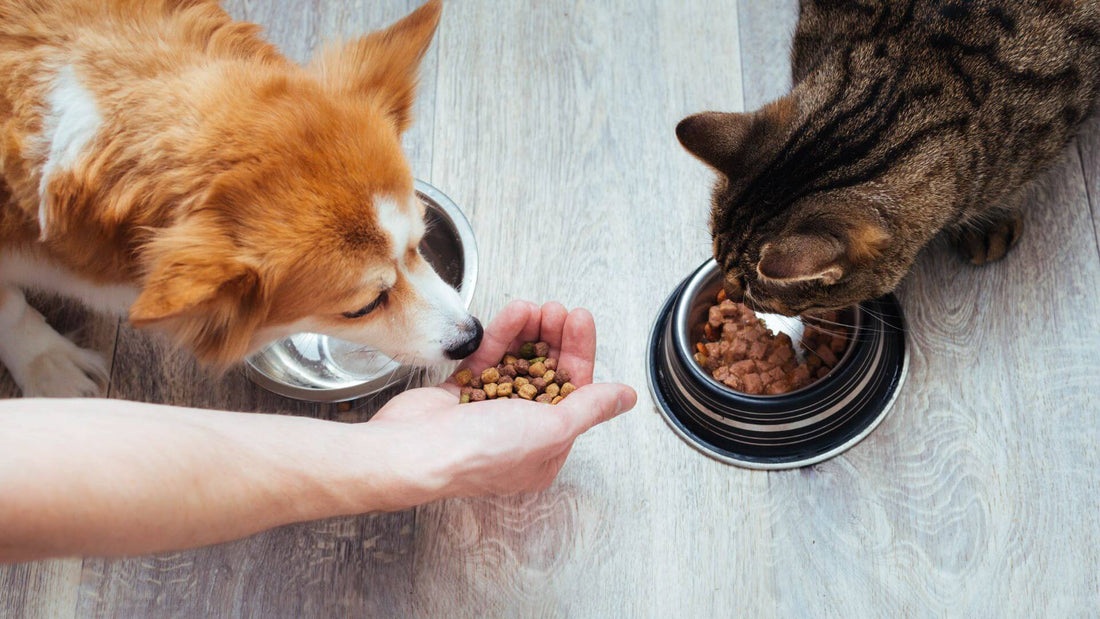As a pet owner, ensuring the health and well-being of your furry friend is a top priority. One of the most important aspects of pet care is providing them with a well-balanced and nutritious diet. However, with so many conflicting opinions and information out there, it can be challenging to know the best way to feed your pet. That's why in this blog, we'll be exploring the optimal feeding frequency and schedule for your pet's specific needs.
Make the most of your time while providing your beloved companion with the nourishment they require to thrive. So let's dive in and discover the secrets to keeping your pet healthy and happy through their feeding routine.
Meal Time and Frequency of Meals for Dogs
Proper nutrition is a critical component of your dog's overall health and well-being. However, feeding your furry friend the appropriate amount of food can be a daunting task, especially if you're a new pet owner. While commercial dog foods often provide feeding instructions, these recommendations are typically based on averages and may not accurately reflect your dog's individual needs.
To determine the optimal amount of food for your pup, you'll need to take into account several factors beyond their weight and activity level. For instance, different breeds have different metabolic rates and energy requirements, which can impact their feeding needs. Additionally, puppies and senior dogs have unique nutritional requirements that may differ from those of adult dogs.
Whether you're raising a new puppy or caring for an older dog, taking the time to develop a customized feeding plan can help provide your furry friend with the best possible care and support.
Feeding Schedule and Frequency for Adult Dogs

Here are some guidelines for determining how much to feed an adult dog:
Frequency:
● Medium dogs need two meals daily.
● Small breeds may need to eat three times a day.
● Large dogs may eat once a day.
Recommended Schedule:
● Feed them during breakfast or dinner.
● You may also feed before and after work.
How much should adult dogs eat?
Your dog's feeding frequency depends on how much they actually need for the day. Here's how you can determine this:
● Ask your vet for their precise recommendations.
● Check the feeding guide in your pet food packaging.
Feeding Schedule and Frequency for Puppies

In general, puppies need to eat more often than adult dogs and will need to consume more calories on a daily basis. They also require higher amounts of protein and fat in their diet.
Frequency:
● 3 meals per day (when they are under six months)
● 2 meals per day on average after
If you want your puppy to be healthy and happy, it’s best not to skip or delay feeding them because this can lead to overeating later in the day or night when they finally do get dinner!
How much should puppies eat:
No more than ¼-½ cup dry food per pound of body weight per feeding session.
You don’t want them eating too much at any time, so stick with portion sizes that are smaller than what you would give an adult dog.
Meal Time and Frequency of Meals for Cats
The best way to determine how much food to feed your cat is by looking at its size. Cats are carnivores, so they need protein in their diets. Canned food has more protein than dry food and should be used as a base for feeding cats.
For example, if you have a small cat without much of an appetite (such as one who isn't feeling well), then you can use canned food as the base and mix it with dry food to make up the rest of their meal's ration. If you want to give your cat wet foods with more moisture content, then you should do so in moderation. Because these types tend not to contain much protein material, most vets recommend increasing consumption levels over time rather than decreasing them too quickly.
Feeding Schedule and Frequency for Adult Cats

Frequency:
● You can feed adult cats once or twice daily.
● Diabetic cats should be fed whenever you administer them insulin.
Recommended Schedule:
● Synchronize feeding times with your schedule.
● Feed them early in the morning before you begin your activities and in the evening after everything's done.
● Alternatively, you may give them all the food they need once when you're least busy.
How much should adult cats eat?
Here's what you can do to know how much food should you give your cat:
● Talk to your vet to get recommendations based on your cat's weight, age, and specific requirements.
● Check the feeding recommendations on your cat food label.
Feeding Schedule and Frequency for Kittens

Kittens and adult cats have different nutritional needs. This is because kittens need more calories, protein, fat, vitamins and minerals than adults do.
Frequency:
● Feed kittens at least three times daily.
● Young kittens may need as many as six meals per day.
How much should kittens eat?
Kittens require more food than adult cats. However, you must feed them in small portions at regular intervals, up to six times a day, depending on their caloric requirements.
The Benefits of a Feeding Schedule
Pets are creatures of habit. They stick to a strict daily routine and would appreciate it if their owners do the same — especially during feeding time.
Additionally, there are plenty of benefits that come with having a daily feeding schedule:
● Scheduled feeding makes your pet feel loved and secure.
● Regular, controlled feeding prevents obesity.
● It helps you monitor their appetite.
Why Free Feeding is Not Recommended
We've mentioned earlier that free feeding may be recommended for some kittens. However, this is not the case for all pets.
Free feeding has serious health consequences. For one, it promotes unnecessary weight gain that can lead to obesity. This stresses your pet's heart and joints and can lead to health issues.
Conclusion
Besides knowing how much and how often you should feed your pet, you should also consider the quality of their food. Check out other posts in the Paleo Pet blog to know how to find high-quality food for your pets. You may also explore our site for a wide selection of nutritious, premium-grade food that your pets deserve.
- The Paleo Pet Team


